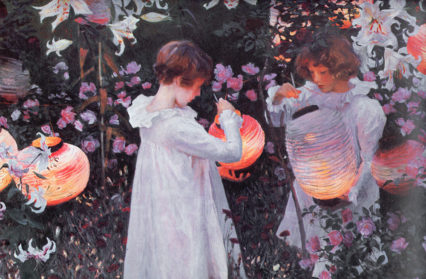Carole Burns with Carnation, Lily, Lily, Rose as the next contribution to Wales Arts Reviews’ Flash Fiction Month, a month-long celebration of the flash fiction form.
I named her Lily, not Rose, for the word itself more than the flower’s extravagant beauty, its sound repeating and repeating like the lilies in the painting, as if they were watching, protecting the girls holding the lanterns in the garden. Sargent’s nieces are luminescent as if lit from within like the lanterns. My daughter looked like that, too, still does, though she’s thirty-seven, as she pointedly reminded me last week, and today, getting married.
Which means I shouldn’t be tarrying here searching through bouquets at the supermarket, where carnations are not paired with lilies, nor lilies with roses. In a flower shop I could pick and choose yet I don’t have the time, or maybe the inclination, with the wedding in nearly two hours. My daughter, the artist; my daughter, the mother; my daughter, the child, Lily, though she calls herself Lil like a hardened housewife from a 50s sitcom, wouldn’t want me to be late.
I abandon the flowers for the tissue aisle, the real reason for my errand, as well as the Starbursts I will secretly slip to myself and Sammy when both of us need something sweet, because Sammy is as scared as I am of this sudden impulse by her mother, though she’s only five and can’t possibly know it. We’d both prefer chocolate but that doesn’t mix well with her pink flower-girl dress even if she has been allowed to wear her pink roller-skate sneakers. Sam likes everything pink, unlike Lily, so maybe names don’t matter as much as we think.
He is older, he is darker like her father, he is wiser – she believes, he believes. He is my age, and because of that I know that he is not any wiser, just more male from those extra years – he’s used to the privilege, though he’d be used to privilege no matter what sex he were, maybe, no matter what age. If a couple occupies one space then I see him taking more and more of it, Lil shrinking, running circles to make sure he’s happy. “I know what I want!” she exclaimed when I asked, how could I not, Are you sure? when I told her, Wait! Things change. Because it’s only been six months. Because I know my child and like me she’s not as strong as she thinks, has a softness she doesn’t admit to. Because she’s never been in love before, despite her age, despite her child, and doesn’t know to measure what is now against what may come.
The New Year’s Eve before Joe died, a big neighbourhood party, midnight, and children and friends are spilling out onto the cold lawn with sparklers and no coats, Lily, too, with the father she can’t remember – her only memories ones, like this, that I’ve given her. He squats down to her level and hands her a sparkler, which crinkles and crisps like twigs in a fire, the light flickering softly on their faces, playing on his hooked nose, his black hair, her puckered chin. Like the girls in the Sargent, she’s too enraptured to smile. I ask, What if it’s your father you’re looking for? “Oh Mom,” her face crumples, “not everything’s about Dad.” For you, I think. I think, and remember how he let you be in that circle of light, just watched you watching the sparklers, before the new horrible year sneaked in.
So I come home with four lilies, all pink for Sammy, cut off the long stems, and before the ceremony in the garden I pin one lily on each of my loved ones – “Mom we really didn’t need flowers” – but she’s pleased I have bought one for Jonathan, even his name takes up space, like carnation. I sing-song, Carnation, Lily, Lily, Rose – Lil knows what I mean – then Lily, Lily, Lily, Lily – the sound of her name could go on and on. I stand back and watch her fuss with the lily on his lapel and the light through the shaking trees flickers across her face.
Carnation, Lily, Lily, Rose by Carole Burns is part of a Wales Arts Review series publishing original flash fiction pieces by some of Wales’ top authors in a celebration of the unique literary genre and National Flash Fiction Day.












